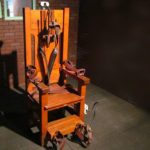WASHINGTON (RNS)—The largest coalition of U.S. evangelicals stepped away from the pro-death penalty stance it embraced the past 40 years.
The board of the Washington, D.C.-based National Association of Evangelicals announced evangelicals who support the death penalty and those who oppose it each can legitimately ground their beliefs in Christian ethics.
The decision, made by resolution, reflects a larger societal shift away from the practice, although it does not reverse the earlier support for the death penalty.
 Theologian Jürgen Moltmann, death-row inmate Kelly Gissendaner and Cathy Zappa, an Episcopal priest and program director at the theological studies program at Arrendale Prison in Alto, Ga., pose at Gissendaner’s 2011 graduation from a theological certificate program offered by the Atlanta Theological Association. Gissendaner was executed Sept. 30. (BNG Photo)“This is a sign of shifting, but not decidedly changing sides, on the death penalty,” said Ed Stetzer, executive director of LifeWay Research.
Theologian Jürgen Moltmann, death-row inmate Kelly Gissendaner and Cathy Zappa, an Episcopal priest and program director at the theological studies program at Arrendale Prison in Alto, Ga., pose at Gissendaner’s 2011 graduation from a theological certificate program offered by the Atlanta Theological Association. Gissendaner was executed Sept. 30. (BNG Photo)“This is a sign of shifting, but not decidedly changing sides, on the death penalty,” said Ed Stetzer, executive director of LifeWay Research.
“A strong majority of evangelicals are still in favor of the death penalty, but that’s moving from an overwhelming majority to a strong one,” Stetzer added. “My guess is that shifting will continue. That’s why they are called trends; they continue.”
The NAE board resolution said: “Evangelical Christians differ in their beliefs about capital punishment, often citing strong biblical and theological reasons either for the just character of the death penalty in extreme cases or for the sacredness of all life, including the lives of those who perpetrate serious crimes and yet have the potential for repentance and reformation.
“We affirm the conscientious commitment of both streams of Christian ethical thought,” it continues.
National Latino Evangelical Coalition
The NAE, which represents more than 10 million Americans and 45,000 congregations, is not the first large evangelical group to adjust its death penalty views. Earlier this year, the National Latino Evangelical Coalition, which represents 3,000 congregations, advocated for an end of capital punishment.
Sign up for our weekly edition and get all our headlines in your inbox on Thursdays
The softening of evangelicals’ support for the death penalty particularly is significant in light of their strong support compared with other religious groups. A report from the Public Religion Research Institute from September 2014 found 59 percent of white evangelical Protestants—more than any other religious group surveyed—preferred the death penalty to life in prison with no chance of parole for those convicted of murder.
 But nonwhite evangelicals part with their white co-religionists on the issue.
But nonwhite evangelicals part with their white co-religionists on the issue.
“The NAE’s decision to change its position on the death penalty is notable because it signals the increasing importance of nonwhite evangelical Christians,” said Dan Cox, research director at the Public Religion Research Institute.
“Most white evangelical Protestants support capitol punishment, but it is decidedly unpopular among black and Hispanic Protestants,” he said. “The NAE’s policy shift is an acknowledgment that black, Hispanic and Asian evangelicals are going to play a vital part in the future of evangelical Christianity in the U.S.”
Death penalty challenged
Most states, 31, allow the death penalty, although the number rejecting it has increased in recent years. The Supreme Court is set to revisit the issue this session, with several death penalty cases on the docket so far. And although none of the cases directly asks the question, two justices—Ruth Bader Ginsburg and Stephen Breyer—have challenged the constitutionality of capital punishment.
NAE President Leith Anderson characterized the move in terms of evangelicals’ larger advocacy for respect for life from womb to tomb.
“Life is the gift of God, and humans are created in God’s image, and this speaks to that core issue,” he said. “It’s important because as evangelical Christians but also as American citizens, we want to engage in how our country lives and the laws of our nation.”














We seek to connect God’s story and God’s people around the world. To learn more about God’s story, click here.
Send comments and feedback to Eric Black, our editor. For comments to be published, please specify “letter to the editor.” Maximum length for publication is 300 words.